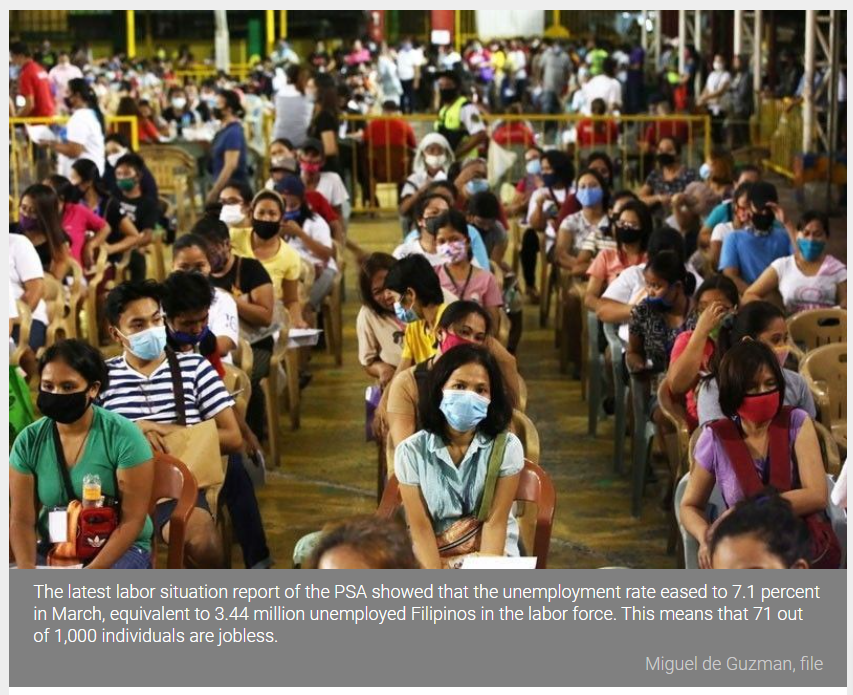Philippines: Jobless rate down to 7.1% in March
MANILA, Philippines — The number of unemployed Filipinos last March declined to its lowest level since the start of the pandemic last year, the Philippine Statistics Authority (PSA) said.
The latest labor situation report of the PSA showed that the unemployment rate eased to 7.1 percent in March, equivalent to 3.44 million unemployed Filipinos in the labor force. This means that 71 out of 1,000 individuals are jobless.
The latest jobless number is a significant decrease from the 8.8 percent rate in February, which is equivalent to some 4.2 million Filipinos who have no jobs.
It should be noted that the March Labor Force Survey was conducted prior to the reimposition of strict quarantine measures in Metro Manila and nearby provinces due to surging COVID-19 cases.
The 7.1 percent rate is the lowest reported since April 2020 or during the height of COVID-19 lockdowns in the whole country.
In a joint statement, the country’s economic managers said the labor market continued to see gains amid the slow reopening of the economy.
However, the lockdown from March 29 to May 14 is expected to reverse the employment gains in the next round of labor force surveys.
“But the impact is expected to be less severe compared to April 2020 given our more risk-managed approach to the present quarantines,” the economic team said.
“Most sectors of the economy, including public transport, this time around are allowed to operate subject to guidelines from the government,” they said.
Meanwhile, the underemployment rate, pertaining to the proportion of workers looking for more hours of work, also eased during the month.
Underemployment went down to 16.2 percent or 7.34 million Filipinos from 18.2 percent or 7.85 million in February.
The PSA said the country’s labor force participation rate, or those Filipinos aged 15 years and above, improved to 65 percent of the total working age population from 63.5 percent.
This is equivalent to around 48.77 million economically active Filipinos, whether employed or looking for work.
National Statistician Dennis Mapa said the labor force participation rate has increased since October last year following the opening up of the economy.
This means that more people searched for livelihoods as quarantine restrictions were eased. Overall, 2.2 million jobs were restored during the period.
This brings the total employment rate to 92.9 percent, translating to 45.33 million employed Filipinos.
“There was a significant increase in the participation of those aged 15 to 24 years old and those aged 65 and above as restrictions were eased and they were allowed to go out,” Mapa said.
The average weekly hours of work of an employed person also improved to 39.7 hours compared to the 38.9 hours in the previous month.
The industries that showed the most improvement in job creation include construction with 846,000 jobs, wholesale and retail trade at 672,000, and agriculture and forestry at 623,000.
Declines, on the other hand, were recorded in education, transportation and storage, and other service activities.
Meanwhile, research and advocacy group IBON Foundation said the improvement in the job situation remains an illusion as many Filipinos have yet to regain their full-time work while some are just trying to get by on informal and irregular work with likely low and uncertain incomes.
“Recovery is stifled by the economic managers refusing to give more ayuda, improve the welfare and increase the purchasing power of households and stimulate small businesses and the national economy,” IBON said.
“The government can arrest the problem by giving much more emergency cash assistance which will not just improve household welfare but also boost aggregate demand and spur more recovery,” it said.
As Metro Manila and nearby provinces were placed under the strictest community quarantine again, Mapa said its impact would be captured on the April round of labor force survey.
“Based on our previous ECQs, we really have low employment and high unemployment but we have to wait. The trend right now is downward for unemployment,” Mapa said.
“The 7.1 percent is still high compared with the pre-pandemic level but it is also on the downward trend and we hope it will continue when we report the next round of labor force survey,” he said.
Workers are grouped into the three sectors, namely, agriculture, industry, and services sector. Those in the services sector comprised most of the employed persons accounting for 56 percent share during the period.
Services sector was followed by agriculture with 24.6 percent share while the industry sector accounted for the smallest share of 19.4 percent.
Source: https://www.philstar.com/business/2021/05/07/2096362/jobless-rate-down-71-march


 Thailand
Thailand




